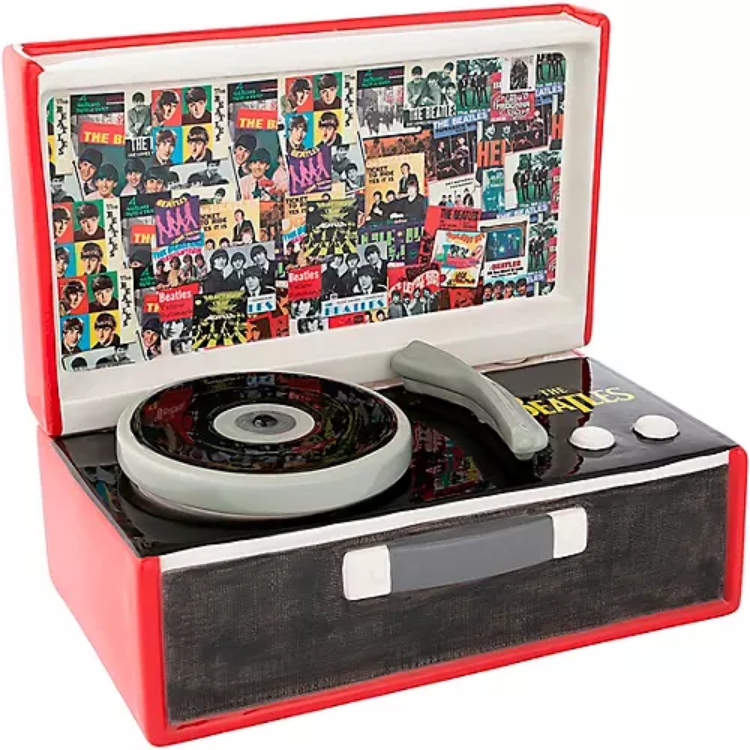- Register
- Log in to Tune-In
- Wishlist (0)
-
Shopping cart
(0)
You have no items in your shopping cart.
Beatles News

The legendary singer shared a photo of the two icons together working on a song for her new album.
Love is in the air as Barbra Streisand is teasing “My Valentine,” her duet with Paul McCartney, which will be released on Friday, May 16.
Streisand took to Instagram on May 14 to share a photo of the iconic pair in the studio together along with the caption, “What a joy it was to record “My Valentine” with @paulmccartney. To share time with him in the studio was truly special! “My Valentine” is out this Friday.”
Both are dressed sharply in all black in the photo with Streisand wearing a matching hat and glasses as the two study the lyrics to the song they’re recording.
It’s the first track that will be released from Streisand’s upcoming album, The Secret of Life: Partners, Volume Two, which features a wide array of stars alongside Streisand and McCartney. Others dueting with Babs on the album include Hozier, Sam Smith, Bob Dylan, Laufey, Mariah Carey, Ariana Grande, Tim McGraw, James Taylor, Sting, Josh Groban and Seal. The album is set for release on June 27.
Fans loved the photo of Streisand and McCartney, res details

When it was announced that The Beatles were going their separate ways, the world was heartbroken. While it wasn't necessarily a dramatic split, the band, which consisted of John Lennon, Paul McCartney, George Harrison, and Ringo Starr, was embroiled in a bitter year-long battle riddled with passive aggression and jibes. It was fought in sly remarks, pointed lyrics, petty walkouts, and then the occasional bigger moment, like when Harrison, known as the "Quiet Beatle," walked out on January 10th, 1969. He recounted the pivotal moment in his dairy at the time, penning: "Got up, went to Twickenham, rehearsed until lunch time – left the Beatles – went home."
Harrison, who was 26 years old at the time, appeared to handle his walk out with little to no emotion. He even added other details into his diary entry, like what he had for dinner: "... and in the evening did King of Fuh at Trident Studio — had chips later at Klaus and Christines went home." But even in the moment when Harrison delivered the news to the rest of the band, he was calm and seemingly unaffected.
During the Get Back sessions, when the band was trying to write an album quickly to perform it, planning to details

These days, when it comes to sales and streaming charts, The Beatles are more successful with albums. That’s common among legacy acts, as fans tend to focus their attention on the full-lengths that originally propelled the musical icons to superstardom, as well as compilations that assemble their most familiar singles. The Fab Four regularly appears on multiple album rankings in the United Kingdom, where the rock legends remain most popular.
While the focus is usually on albums, interest in several Beatles cuts grew last week. The band manages to push a number of tunes back onto different lists, scoring multiple bestsellers long after most music fron the rockers was released.
“I Want to Hold Your Hand” is a Bestseller Again
The Beatles currently appear inside the top 40 on two separate sales rankings in the U.K. One of the group’s oldest tunes, “I Want to Hold Your Hand,” is a true bestseller once again. The track reenters the Official Vinyl Singles chart at No. 23. It lands just one spot lower, at No. 24, on the Official Physical Singles chart, which includes not only vinyl purchases, but also CDs and cassettes. On that roster, The Beatles don't merely bounce back &mdash details

John Lennon was just 40-years-old when he was murdered outside the Dakota in New York City.
The Beatles' singer-songwriter was shot twice in the back and twice in the shoulder by Mark David Chapman as he returned to the building with Yoko Ono following a recording session. John was rushed to hospital, but was sadly pronounced dead on arrival.
In the months that followed his death, Beatles expert David Stark met with John's aunt, Mimi Smith. John lived with his aunt for most of his childhood and the pair remained close throughout his life, with John even calling Mimi every week until his death.
Recalling his meeting with Mimi, Stark exclusively told The Mirror US, "I really got on with her." He explained how they'd been introduced by a mutual friend who was visiting Mimi at the time. Stark said, "This American girl said, 'Come down and meet Mimi and maybe try and cheer her up', because that was in the summer of '81 and John being killed in December 1980s."
The Beatles expert explained how he had never met Mimi before traveling to meet her for a weekend in 1981. "I didn't stay with her, but I was in the bungalow over the weekend and just chatting," he explained.
Star details

At times while in The Beatles, George Harrison had to fight to make his voice heard. With John Lennon and Paul McCartney assuming creative control of the band as their primary songwriters, George's writing did not always take centre stage.
The Wavertree-born star had written some songs that The Beatles recorded on their early records - he was given a quota of compositions for each album. When the band retired from touring in 1966 and focused on recording innovative music in the studio, George grew frustrated with the supporting role he had to play on 'Sgt Pepper's Lonely Hearts Club Band' and 'The White Album'.
This came to a head in January 1969, as The Beatles began work on what would become their final album 'Let it Be'. George walked out of the band temporarily, fed up with the mood and the way he was being treated. The bad mood that marked the recording of 'Let it Be' had its roots in the 1968 sessions for 'The White Album', which had been notoriously tempestuous. Ringo Starr departed the band for a period during the recording of 'Back in the USSR' and it seems George was also affected by that time.
The sessions for 'The White Album' came after The Beatles' retreat in India. George had l details
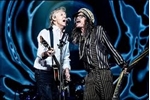
If you are a man, you know what it’s like to have a conversation at a set of urinals. It’s awkward, weird, and most men seemingly try to avoid it, as the mutual understanding is that you don’t talk to another person when you’re using the restroom. However, that rule has to be broken every so often, and Steven Tyler broke it when he met Paul McCartney for the very first time.
Everybody knows Steven Tyler as a free-spirited musician who is no stranger to ambitious and intense rock and roll antics. As we all know, he is quite the animated character. That being said, it isn’t all that surprising to learn that Steven Tyler first met Paul McCartney during a stop in the restroom at a urinal. Frankly, it is arguably the perfect setting for this type of interaction. It’s memorable, comical, and just downright hilarious. Regardless, here is how Steven Tyler first met Paul McCartney at a urinal.
While at the Hammersmith Odeon theater in London, Steven Tyler needed to do what everybody needs to do: Use the restroom. However, what was seemingly intended to be a routine visit turned into a once-in-a-lifetime interaction. And Steve Tyler recollected the one-of-a-kind moment in an exclusive i details

Fans of the legendary musician Sir Paul McCartney are still hoping his "sequel" to a Beatles album will be released.
Though there is no indication his follow-up to one of the Fab Four's biggest records will receive an official release, fans remain hopeful of having it out there for people to listen to.
Return to Pepperland was the name given to an unfinished recording project by McCartney and American record producer Phil Ramone. It was produced as a tribute to the 20th anniversary of the 1967 Beatles album Sgt Pepper's Lonely Hearts Club Band.
A post to the r/PaulMcCartney Reddit page has seen fans share their reasons for the album not yet releasing, as some suggest it may never be published. Those who have heard the album on a bootleg tape, however, say it is one of McCartney's best.
One user who has heard the release called it a "great album" with a "fantastic" title track that is in need of an official release.
The album itself is one of McCartney's most bootlegged albums, meaning dedicated fans have pieced together official recording tapes to assemble what could have been the tracklist to his unreleased follow-up to Sgt. Pepper's Lonely Hearts Club Band.
While you can listen details
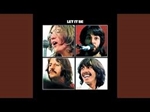
About 16 months after the process of recording it began, Let It Be trickled into record stores. It arrived in May 1970, 55 years ago this month. By that time, Beatles fans had started to mourn the fact that the four men’s professional relationship had ruptured.
Anniversaries of the release dates of other Fab Four albums are generally a cause for celebration and reflection. With Let It Be, maybe it’s only the reflection part, as we all try to get a handle on this legacy of this star-crossed project.
As had been the case with several Beatles’ projects in the second half of their recording career, Let It Be, or Get Back, as it was also known for a while, belonged to Paul McCartney. The Beatles would create a new album from scratch, film a documentary about that process, and then close the whole thing out with a live performance of the fresh songs.
McCartney saw it as a way of pulling the band back together after The White Album had progressed at times like it was four separate solo albums. He misjudged the growing disenchantment of John Lennon and George Harrison. The dour environment, with blinding lights pouring down on the band in the cold studio, didn’t help tempers m details

Paul McCartney said John Lennon always thought he was up to no good. Lennon once accused McCartney of sabotaging his songs.
John Lennon and Paul McCartney began to butt heads in the latter half of the 1960s. While they had worked closely together in the early years of The Beatles, their collaborative process grew increasingly fraught. Lennon even went so far as to accuse McCartney of trying to sabotage some of his songs. He shared how he thought McCartney did it.
John Lennon said Paul McCartney subconsciously ruined songs
Lennon saw “Across the Universe” as one of his best songs ever. He didn’t like the band’s recording of it, though. He blamed McCartney for this.
“I think subconsciously sometimes we — I say ‘we,’ though I think Paul did it more than the rest of us; Paul would … sort of subconsciously try and destroy a great song,” Lennon said, per the book All We Are Saying: The Last Major Interview With John Lennon and Yoko Ono by David Sheff, adding, “He tried to subconsciously destroy my songs, meaning that we’d play experimental games with my great pieces like ‘Strawberry Fields’ — which I always felt was details

As one half of the most celebrated songwriting duo in pop music history, Paul McCartney is generally cast as the sweet sentimentalist to John Lennon's acerbic, avant-garde iconoclast. This is, of course, a gross oversimplification — McCartney's interest in experimental tape loops resulted in "Tomorrow Never Knows," one of the most out-there tunes in the Beatles' discography — but his reputation as the Beatle who wrote "silly love songs" stuck. To a certain extent, the shoe did fit: After all, the man managed to make a song about a guy who killed people with a hammer sound like something your grandmother might like. With that in mind, the fact that McCartney's favorite childhood snack was sugar sandwiches seems comically on-the-nose.
In an Instagram Q&A with his daughter Mary, Paul talked about his love for "sugar butties" ("butty" is an English slang term for "sandwich.") Although he described them as "seriously decadent and not good for you at all," the fondness in his voice is evident as he remembers them. "It was just like bread and butter, but with sugar on it — ha-hey! — and that was it."
The star's tastes have clearly changed since his childhood in Liverpool. Nota details

The youngest member of the Fab Four went on to say he "never" wanted to be a Beatle again - but that didn't mean he completely hated his time in The Beatles. George Harrison often said 'Beatles George' wasn't his true self.
Music legend George Harrison once confessed that he merely "acted out the part" of "Beatle George," suggesting it was a persona that didn't reflect his true self. As the youngest member of the Fab Four, Harrison was swiftly labeled the "Quiet Beatle" after the band skyrocketed to international fame in the early '60s.
Post-Beatles, though, Harrison frequently discussed the various pressures, uncertainties, and both physiological and psychological burdens of Beatle life. His salvation, his sense of grounding, was found through spirituality and the catharsis of creating new music, much of which he stashed away for future use.
In a candid conversation with David Wigg for a BBC Radio-One program in October 1969, Harrison expressed readiness to leave The Beatles behind. He had sampled this exit about 10 months earlier when he walked out on the stress-riddled Let It Be sessions, only to rejoin, albeit fatigued, some days later. During the discussion, Harrison articulated a detachment f details
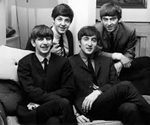
The legacy of The Beatles is completely intertwined in the fabric of music today, not only due to their groundbreaking sound, but also due to the way that they redefined what a band was. Although their impact still resonates throughout pop and rock today, it is interesting to consider that their spectacular ascension took place during an entirely different period, one of physical media like CD, cassette, and vinyl, and fostered by radio, not algorithms.
They achieved this during an era when albums were to be listened to in toto from beginning to end, and each release was an event. With more than 600 million records sold globally, they not only topped charts but redefined them. Their studio gambles as artists, from unorthodox song structures to experimental recording methods, pushed music to new frontiers.
Artists today can pursue viral singles and streaming figures, but The Beatles established their legacy in a slower, analog age, one where cultural longevity was more important than a position on a playlist.
Even in the era of today's rapid-fire, digital-first music culture, The Beatles remain an imposing force, always attracting fresh waves of listeners via streaming sites. Their record, decades since i details

The Beatles always seemed to be hurtling forward with relentless momentum during their recording years. Despite their breathless pace, they still managed to keep things under control when it came to the music that they made.
In that way, “I’ve Just Seen A Face”, found on the group’s 1965 album Help!, stands as a pretty good approximation of their career. Even as the song flies by at sizzling speed, it stays on the rails and delivers its poignant message.
“Face” Dances
Folks often mention Rubber Soul and Revolver as the LPs where The Beatles started to make complete artistic album-length statements. Help!, the record released directly preceding those two, doesn’t get that same kind of recognition. Some of the tracks lack the ambition that would soon become the hallmark of just about every Fab Four song.
But one factor that stood out on Help! was the group’s willingness to go outside their comfort zone when it came to song styles. There was gentle folk (“You’ve Got To Hide Your Love Away”) and heavy pop (“Ticket To Ride”). String quartets (“Yesterday”) hung out next to screaming rock (“I’m Down” details

Paul McCartney and John Lennon wrote the vast majority of The Beatles' songs and were the creative leaders of the group. The two often wrote in tandem in the early years before artistic differences in the second half of the 1960s saw them write more independently and then present songs to one another for tweaks and edits.
About their writing partnership Wilfred Mellors wrote in 1972: "Opposite poles generate electricity: between John and Paul the sparks flew. John's fiery iconoclasm was tempered by Paul's lyrical grace, while Paul's wide-eyed charm was toughened by John's resilience."
But it wasn't just John and Paul who wrote the band's songs. George Harrison was also an accomplished songwriter - even though he had to fight to make his voice heard at times, with Paul and John assuming creative control.
In the early days, the Wavertree-born star had written some songs that The Beatles recorded and was given a quota of compositions for each album. But in the band's later years he delivered classics like 'Something', 'While My Guitar Gently Weeps' and 'Here Comes the Sun'.
In total, George wrote 22 songs that The Beatles recorded. Drummer Ringo Starr also provided two of his details
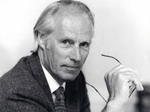
When it comes to legendary producers, George Martin has to be at the top, mostly because he helped invent the role. The classically trained arranger and studio magician shaped The Beatles’ sound while reshaping what a record producer could be. These 10 tracks are a testament to his genius, showing off his ability to turn tape, strings, and sonic experimentation into musical history. Here’s to the man behind the curtain.
“A Day in the Life” – The Beatles
A breathtaking final track for ‘Sgt. Pepper’s,’ Martin orchestrated one of the most audacious climaxes in rock history. That swelling 40-piece orchestra? That thunderous piano chord? That’s George Martin making chaos into beauty.
“All You Need Is Love” – The Beatles
Broadcast live to the world in 1967, Martin turned what could’ve been a chaotic moment into something timeless. He wove in La Marseillaise, Bach, Glenn Miller, and even a Beatles quote—proving love and production both benefit from a little imagination.
“Eleanor Rigby” – The Beatles
No drums. No guitars. Just a haunting string octet arranged by Martin and a tale of loneliness sun
details

